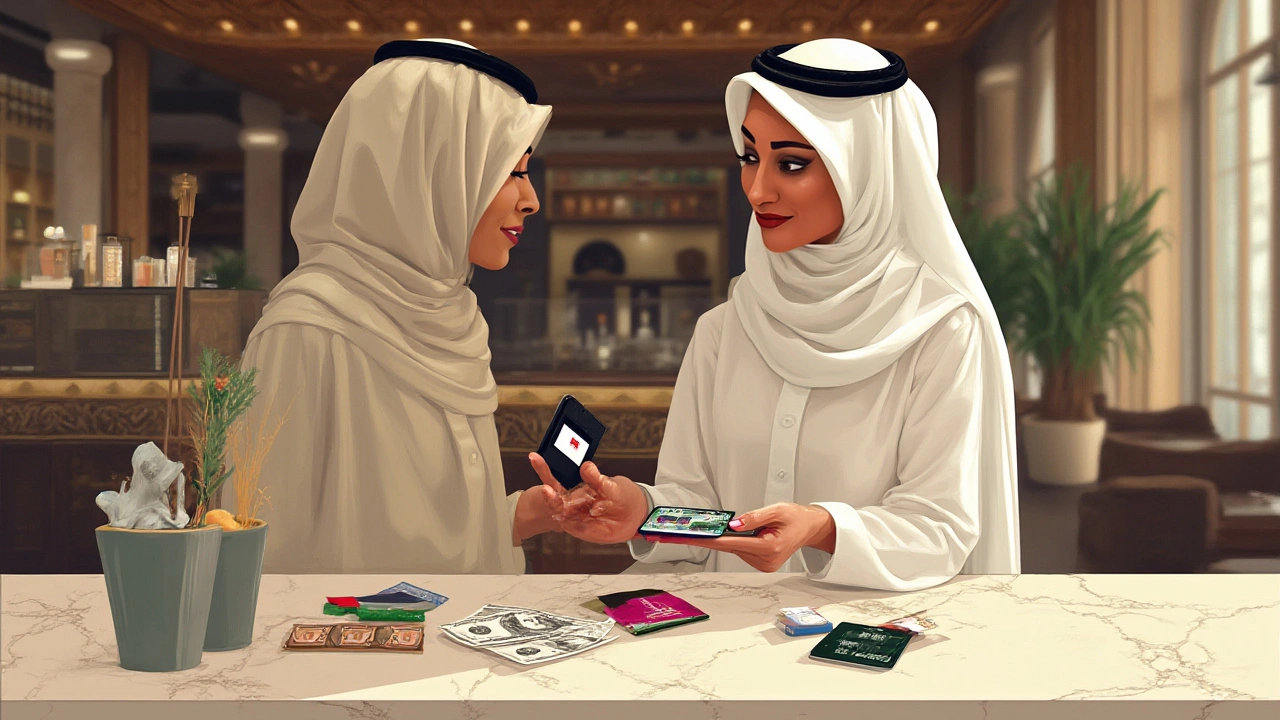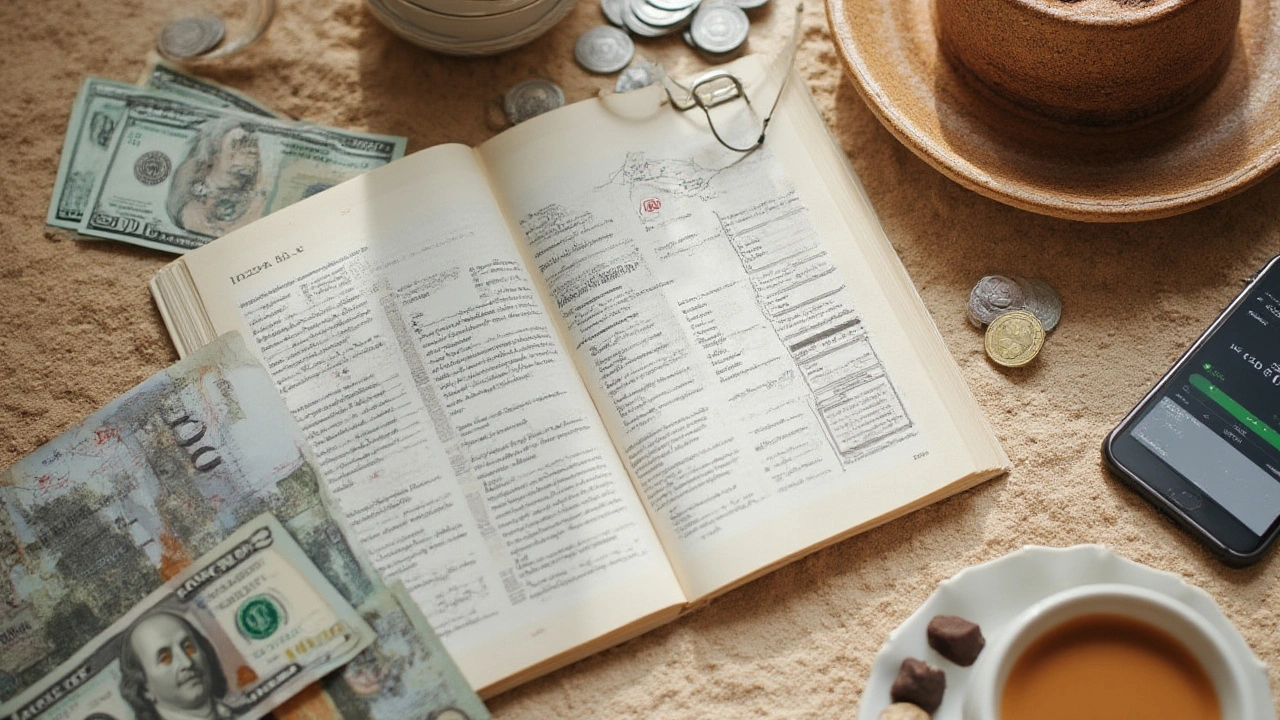Flashy malls packed with luxury goods, rooftop cocktails with a sunset view, clubs buzzing all night—and someone flashes a Benjamin at the bar. Does this move work? Can you pull out crisp US dollars to impress, or will you get a blank stare? Dubai loves international travelers, but money here still works on its own rules. The hotel concierge might smile at your dollars—but is he just humoring you? What about taxis, stores, beach bars, or that wild impulse buy at the Gold Souk?
What is the Official Currency in Dubai—and Why It Matters
Dubai might look like Las Vegas with palm trees and zero gambling, but its official currency is not the dollar. Everywhere you go, you’ll see prices listed in AED, which stands for “Arab Emirates Dirham.” The dirham (often shown as DH or Dhs) has been the UAE’s official currency for decades, replacing the Qatar-Dubai riyal back in 1973. Nationwide, whether you’re in the fanciest sky bar or grabbing shawarma at a street corner, AED is king, and prices are set in dirhams. The current exchange rate as of July 2025 hovers at about 3.67 AED per US dollar (and has barely moved in over 25 years, so no wild currency swings).
Here’s the thing: while Dubai is super international, daily business runs on AED. You won’t see prices in dollars posted anywhere. All ATMs, payment machines, metro stations, and bank counters will talk to you in dirhams. Even big chains—think Carrefour, Zara, or McDonald’s—don’t list dual currency options. Having local currency on hand saves you so many awkward payment moments.
To give you a quick snapshot, here’s how some essentials look in 2025 dollars and dirhams side by side:
| Item | Dirhams (AED) | US Dollars (USD) |
|---|---|---|
| Big Mac Meal | 28 | ~$7.60 |
| Taxi (10 km, daytime) | 40 | ~$10.90 |
| Starbucks Latte | 21 | ~$5.70 |
| Standard hotel room (midrange, per night) | 400 | ~$109 |
| Mall water bottle | 5 | ~$1.36 |
This gives you an idea of what you’ll need in AED and how things compare to US prices. But what happens if you walk in waving a $20 bill?
Where (If Anywhere) Can You Actually Spend US Dollars in Dubai?
Here’s the truth bomb: the US dollar is not a legal currency in Dubai. Shops, restaurants, taxis, and pretty much any local business are not required—or even encouraged—to accept anything but dirhams. Flashing greenbacks will get you a polite smile or a confused head shake at most places. This includes everything from the Dubai Mall to the palm-tree-lined streets of Jumeirah. Government offices, train stations, cinemas, postal services—forget it. You need dirhams.
However, if you’re in the glitzy downtown district or a super-luxe resort, there’s a small chance someone might say yes, especially at higher-end hotels or big-name international chains. Some upscale hotels can settle a bill in USD for guests from the US or Europe, but you’ll be hit with an unfavorable exchange rate, plus an extra ‘convenience’ service charge. The majority of bars or nightlife spots won’t take dollars. For independent shops, taxis, museum tickets, local markets (souks), or even Uber, dollars are a no-go. Beach kiosks might take your cash “under the table,” but expect change to come in dirhams, if at all, and don’t count on the rate being fair.
If you try using dollars in Deira’s Gold Souk or a touristy desert safari, a vendor might entertain you if you’re buying something expensive, but again, the price will probably get rounded up a lot. You’ll always lose out compared to paying in local money. Dollar acceptance is the exception—not the rule. If you want to avoid embarrassment, get dirhams or use a credit card.

The Best Way to Pay: Cash, Card, or Digital?
Dubai is obsessed with luxury, yes, but it's just as obsessed with digital payment and tech convenience. The entire city is hard-wired for cashless payments. Credit and debit cards (Visa, Mastercard, and now increasingly American Express) work at basically every mid- to high-end establishment. That means malls, restaurants, bars, hotels, boutiques, groceries, pharmacy chains—you get the idea. You can also tap your phone with Apple Pay, Google Pay, or Samsung Pay almost everywhere at checkout. No drama, no fuss.
For the few moments when cash is king—like small purchases in local markets, tipping a porter or delivery guy, or paying the occasional taxi—ATMs are everywhere. Withdraw in dirhams and avoid airport currency exchange kiosks if you can, as they give pretty bad rates. If you must change cash on arrival, consider one of the big bank branches (like Emirates NBD, Mashreq, or Dubai Islamic Bank), though you’ll need your passport for large transactions.
Some tips for handling money without headaches:
- Let your bank know you’re traveling, to avoid card freezes.
- Get a card with no foreign transaction fees, as they’ll eat up 1-3% of every purchase if you don’t.
- Don’t let ATMs or shops bill USD “to make it easier.” This is called dynamic conversion—a sneaky trick that gives a terrible conversion rate. Always pick “charge in AED.”
- Keep a mix of small bills for tipping—10-20 dirham notes are perfect for hotel staff or delivery people.
- If you want to be really cash-free, download the Careem app (Dubai’s Uber) or use Nol cards for the metro—both are tap-and-go with a linked credit card.
- Lost card? Carry a backup for emergencies. Some places still ask for chip-and-PIN entry, so don’t rely only on swipe or tap.
You can survive your entire trip with just cards and maybe the equivalent of $100 in dirhams for those rare cash needs. That’s how locals do it, and it’s a smooth, safe option.
Understanding Fees, Rates, and Change—How Not to Get Ripped Off
Dubai loves tourists, but it has a few tricks up its sleeve. Let’s talk about currency exchange and fees. If you try to swap dollars for dirhams at the airport or your hotel, you’ll get a far worse rate than the one you see on Google. Expect commission, service charges, and a “spread”—the difference between the buy and sell rates. Even big name brands like Travelex at the airport will knock 5-10% off what you should really get. Exchanging on the street? Risky—and illegal.
The smart move is to take out dirhams at a bank ATM with a debit card that doesn’t add international fees. Check before you go—banks like Charles Schwab, Capital One, or Revolut (for travelers with EU/UK accounts) often reimburse fees. And always choose “AED” as your withdrawal currency; avoid “USD conversion” at ATMs or shops, which isn’t a favor but a costly swap.
There’s a second little trap, too: cashiers sometimes ask at checkout, “Pay in dollars or dirhams?” Sounds convenient, right? Not so fast. The system picks its own rate to “help,” and it’s usually 3-8% worse than paying in dirhams and letting your home bank handle the conversion. Always insist on local currency for the payment.
As for getting change—if you somehow pay in US dollars, don’t expect any change back, or if you do, it’ll be in dirhams and probably rounded down. Using local money saves you arguments and confusion.
Little-known hack: Dubai Money Exchangers in malls (like Al Ansari or UAE Exchange) give rates much closer to the interbank rate than airports or hotels. These are regulated, don’t charge hidden fees, and are open late. Bring your passport, and stay alert for your own safety—Dubai is safe, but crowded malls still see pickpocketing sometimes. Never try black market exchanges; laws are strict and penalties are real.

What About Tipping, Shopping, and the “Tourist Flex”?
Here’s where it gets funny—people think Dubai wants endless bling flashed around, but in reality, respect and convenience matter more than currency acrobatics. Tipping, for example, is not officially required but always appreciated by hotel staff, drivers, and servers. Dirham notes (10, 20, or 50) make it simple. Try tipping with US dollars and you’ll get confusion, or politely declined cash—staff have to change it themselves (if they’re allowed at all).
When you’re at a local souk chasing gold jewelry, a rug, or spices, bargaining is expected, but bringing out dollars doesn’t get you VIP prices—it just marks you out as a rookie. Locals know the value of both their own money and yours, and most will insist on dirhams. You might get a “foreigner surcharge” if you’re not discreet. For high-end luxury shopping, all the big brands take card—and a US dollar credit card works fine, so no one cares about your wad of cash. You can get receipts you can use to claim part of the VAT (tax) back at the airport, but only if you pay in dirhams or with registered cards—not cash US dollars.
This tourist “flex” with American dollars is an old story left over from the 90s. Dubai has totally moved on—digital payments and contactless cards are everywhere. Even parties or massive club nights want you to pay at the door with card or NFC apps now.
A final tip? If you absolutely must bring dollars, treat them as backup. Use major banks or licensed exchangers to swap them for dirhams, never hand them over at stores or markets hoping to make it work. You’ll get smoother service, fair prices, and a more relaxed trip where the only thing you’re worrying about is what to wear—not how to pay.
So, does the US dollar work in Dubai? Not really. Carry dirhams, use your cards, and leave the greenbacks for emergencies only. Dubai is full of surprises, but its love affair is with dirham—not the dollar.
Dubai Escort
Write a comment